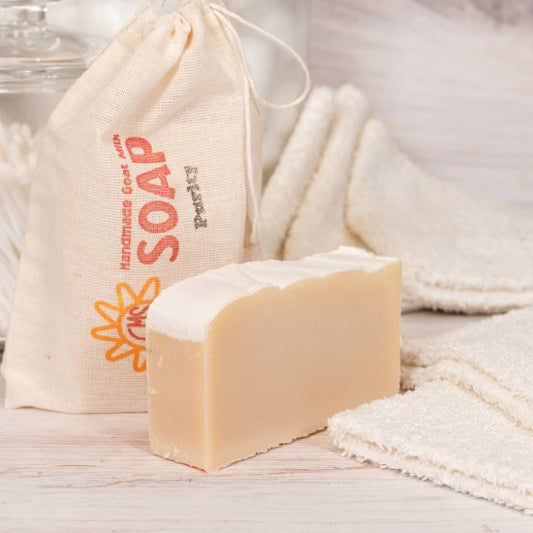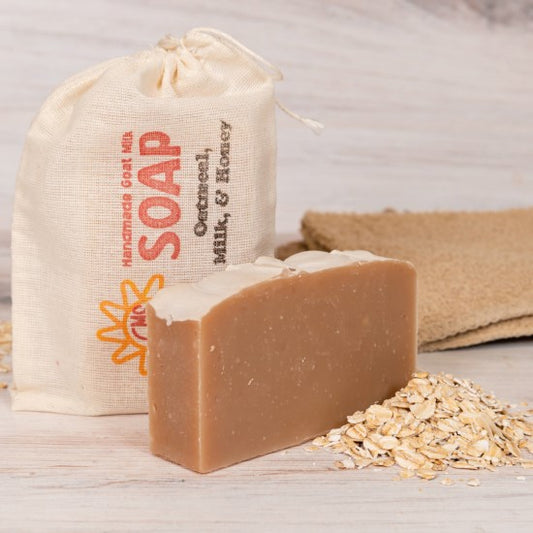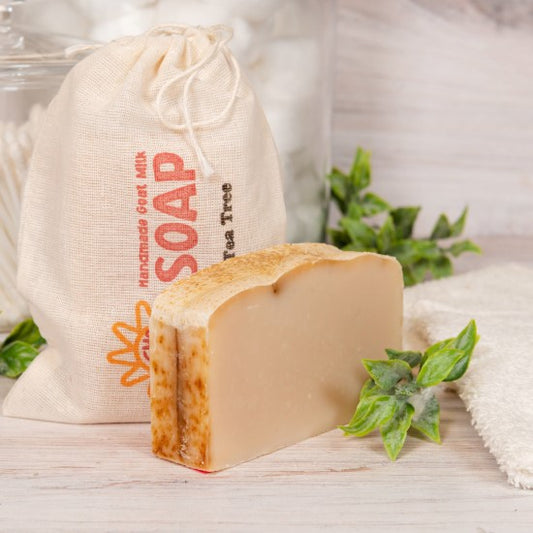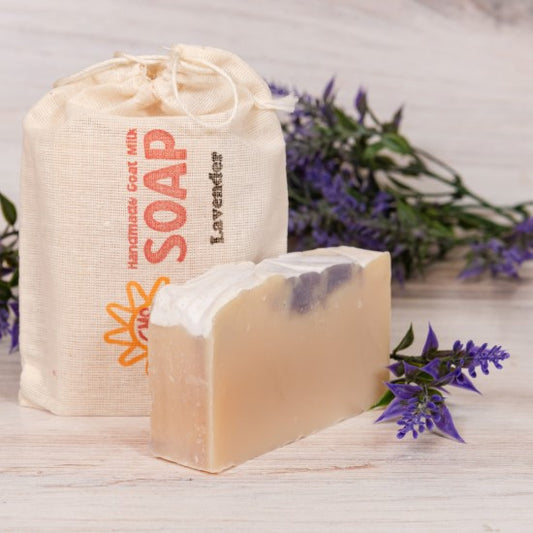Many people pay close attention to what they eat and consider the ingredients that go into their bodies. We’d never knowingly ingest something that we know could harm us, or feed it to our children.
However, it’s easy to be less diligent about what we put onto our bodies. From soaps and facial cleansers to lotions and cosmetics, we use a bevy of skincare products regularly.
You know the nice foamy lather and amazing smell your soaps, shampoos, and lotions produce? For commercial products, those sensations are often created thanks to a variety of harmful chemicals.
Regulations on soaps, lotions, and cosmetics have come under intense fire for over a decade now because of how loosely regulated and confusing the manufacturer's restrictions are to produce safe products.
Common sense may question… “How is that possible?”
Here’s how - big companies can regulate their own product's final ingredient list to a large extent before being sold. To make matters worse, the same manufacturers can hide harsh chemicals behind labels of “natural” or “organic” before they hit the market. Even the savviest of clean-cleaning hopefuls can be in the dark on which soap and skin care products are actually safe.
That’s why, since we started Goat Milk Stuff in 2008, our mission has focused on producing safe and natural goat milk soaps.
 "This Calendula soap has been wonderful for my daughter who has pretty severe eczema. It has hydrated her skin overall, does not dry it out at all and has helped some of the bumps on her skin go away. It’s also all natural and safe so I feel good putting it on her skin!" - Emillie L. |
We Were Duped… How About You?
If you’re just now ditching your tubs filled with harsh chemicals and want safer products for you or your family, congrats! And, don’t be hard on yourself for just getting started either, because our story started in a similar fashion.
It was years after we had kids before we really knew how bad the skin products and baby wash we regularly used really were. We didn’t have thousands of blogs and harsh ingredient whistleblowers exposing what we know today.
But, after we got over the initial shock of how harmful our kids’ baby wash was, we were determined to eradicate all the nasty chemicals from our showers, sinks, and kitchens. I mean, we were a family determined to eat and live clean, so it didn’t make sense to wash our skin with dangerous chemicals, right?
 "I encourage everyone to switch to only Goat Milk Stuff products. I used the Castile olive oil soap for my baby for his hair and body and he is over one year now with no cradle cap ever. A couple of my coworkers switched over for their babies and it eliminated their cradle cap. Just amazing all natural products that give us all an alternative to the harsh chemicals we all thought at one time were “safe” to use." - Chelsea W. |
During our research to produce high-quality natural soaps and skin care products we’ve discovered several problems with big name brand products. That's why we feel it’s important to share our research and help our customers make informed decisions on what soap and skin products they buy.
Let’s dive in.
Five Harmful Ingredients Found In Soaps and Skincare Products
In a long list of potentially toxic substances found in soaps and skin care products, there are five you’ll absolutely want to try to avoid. These five harmful agents are sulfates, triclosan, phthalates, synthetic preservatives, and thickening agents. Below we discuss each one of these harmful ingredients and why you may want to steer clear of them all together.
#1. Avoid Sulfates. Sulfates are used in household cleaners and personal hygiene products worldwide. They’re highly disputed between government and world agencies and boots-on-the-ground clean-living researchers, such as doctors, chemists and professors.
Sulfates' primary function in soaps and shampoos is to create a chemical reaction to foam and clean. This action is the primary cleaning process for any soap or detergent containing sulfates. These are aggressive detergents comprised of sulfur-containing mineral salts. Brands that use them herald their ability to lift grease and oil off your skin and hair, then emulsify the grime and rinse it down the drain.
 "Love the generous suds created and it is lightly scented, I am very "scensitive", spelled like that with intention. The soaps I have purchased (Lavender Peppermint) are just the right amount of scent and they don’t leave a soap scum ring in my tub either. My skin feels clean and no residue either." - Lisa W. |
Two well documented sulfates linked to health issues are Sodium Lauryl Ether Sulfate (SLES) and Sodium Laureth Sulfate (SLS). Research shows strong evidence that SLS and SLES can create skin irritation along with long-term organ problems. Skin irritation associated with sulfates in cleaners is due to the product being left on the skin instead of being properly or quickly washed off.
Other dangers associated with sulfates are the byproducts and trace contaminants they create such as 1,4-Dioxane. Interestingly enough, 1,4-Dioxane is “reasonably expected to be a human carcinogen” as warned by the National Institute of Health.
#2. Avoid Triclosan. This is an antimicrobial agent used by some soap makers, but was banned in 2016 by the FDA. The Mayo Clinic advises people to stay away from Triclosan because the chemical can be absorbed through the mouth and skin. The most documented health issues associated with Triclosan are as follows...
- Hormone disruption
- Weakening of the immune system
- Decreased Fertility
- Cancer.
Even though the FDA forced companies to stop the continued use of Triclosan, you still might see products floating around containing the harmful chemical. The companies who were using Triclosan were given two options when the banning took place - 1) They could pull the chemical from their shelves completely 2) Or, use what was left of the chemical and then halt further use. Chances are Triclosan has phased out to a very low market presence, but the sheer danger of its exposure is noteworthy.
#3. Avoid Phthalates. (pronounced thay-lates) They are hard to remove from your hygiene routine. That’s because you’ll never see the actual chemical “phthalate” listed on a label. Formulas containing phthalates have a blanket of protection under what the FDA deems as trade secrets.
Trade secrets are quite tricky. Most trade secrets protect certain "fragrances”, “flavors”, and ingredients because manufacturers claim they are proprietary information. Many companies use phthalates in soaps and skincare products as a fixative to create certain smells in fragrance. Phthalates are a vital ingredient for tons of plastic consumer goods. Their chemical properties provide more flexibility to plastics while also making them stronger.
 "I've been using the Laundry Soap for a couple of years, and I use it exclusively. I think a lot of the commodity items we purchase can be dangerous for us. So I do not buy toothpaste, deodorant, soap, and cleaning materials from the big companies. The Laundry Soap works great, and I think my wash items are softer using Goat Milk laundry soap." - Jeff A. |
One reason there is a rising fear of phthalates is that they’re everywhere.
Studies have found phthalates in candles, perfumes, household cleaners, soaps, shampoos, lotions - the list goes on and on. So, the concern of harsh or harmful chemicals landing in products designed to protect and clean skin is valid. Long-term phthalate exposure can have a range of adverse impacts on your health. Like parabens, these endocrine-disrupting chemicals can cause damage to human reproductive, neurological, and developmental systems.
In the skincare realm, phthalates are found in almost every product on the aisle. This is why they’re known as the “everywhere chemicals.” From soaps and shampoos to hairspray and nail polish, it’s hard to find a supermarket bath or body solution that’s entirely phthalate-free. The ones you’re most likely to see on your label include:
- DBP (di-n-butylphthalate)
- DEP (diethylphthalate)
- DMP (dimethyl phthalate)
- BzBP (benzylbutyl phthalate)
#4. Avoid Chemical Preservatives. These are widely used in soaps, shampoos, and lotions to prevent bacteria growth in and on products. Two names you might see on your label are Methylisothiazolinone (MIT) and Methylchloroisothiazolinone (MCI).
Both of these chemicals have been linked to lung toxicity and possible neurotoxicity. They can also trigger allergic reactions.
Other common skincare preservatives include the closely-related Butylatedhydroxy Anisole (BHA) and Butylated Hydroxytoluene (BHT). These chemicals are known to cause myriad health concerns, ranging from organ system toxicity to skin irritation.
One of the most well-known preservatives of all is Formaldehyde. In skincare, it’s used to prolong a product’s shelf life and prevent bacterial contamination. However, its health risks far outweigh any benefit it could provide. The acute and long-term effects of Formaldehyde exposure are well-researched and include skin irritation, shortness of breath, and changes in lung function.
Parabens are the most widely used of the preservative ingredients, and it’s also the most notable for creating health problems. Manufacturers not only often use preservatives in cosmetic products, but they can also be found in pharmaceuticals, foods, and beverages.
Parabens are well documented by studies proving they mimic the female sex hormone estrogen and are linked to breast cancer. Skin aging, and DNA damage are two more risks associated with Parabens.
 "I buy Tea Tree for my husband. He has very sensitive skin. This soap has really helped clear his skin. He is allergic to a preservative found in other soaps so this soap is great!" - Audrey H. |
A tricky component to identifying parabens in products is that they can hide behind the ingredient “fragrance” on product labels. So how do you avoid them? One action we recommend is reading your labels and look for any ingredient containing the word - paraben. Here are a short list of parabens you’ll want to avoid…
- Propylparaben
- Methylparaben
- Butylparaben
- Ethylparaben
#5. Avoid Thickening Agents Another range of ingredients to watch out for in your skincare are those used as thickening agents. Manufacturers will often add certain ingredients to their formulas to make them appear thicker and creamier. While you might appreciate the texture, it’s important to know what you’re using.
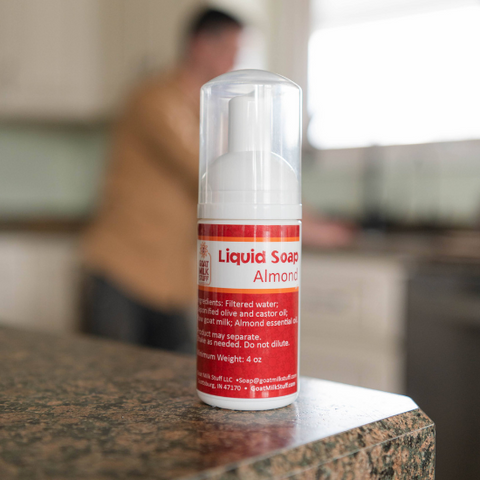 "I have been using goat milk bar soaps for many years but this is the first time I tried the Almond liquid soap. I don’t know what took me so long! It’s amazing! My hands feel squeaky clean and the scent is wonderful." - Kathryn H. |
One of the most common thickening agents is Cocamidopropyl Betaine (CAPB). This ingredient is a common allergen that can lead to skin discomfort and eye irritation. Back in 2004, the American Contact Dermatitis Society even declared CAPB the “Contact Allergen of the Year.”
Manufacturers also use a chemical called Diethanolamine to make their products creamy or sudsy. It can cause nose and throat irritation, and high levels of exposure could lead to liver, kidney, blood, or central nervous system damage.
Other chemicals that act as thickeners include Polyethylene Glycol (PEG) compounds. Polyethylene is the most common form of plastic and turns into a thick, sticky liquid when combined with glycol. These compounds are usually followed by a number (e.g. PEG-6, PEG-8, PEG-100) that represents their approximate molecular weight.
PEG chemicals can contain contaminants, including measurable amounts of ethylene oxide, which can harm the nervous system and interfere with human development.
Now, let's take a deeper dive into the sulfates SLS and SLES...
What are SLS and SLES?
You may have never heard of SLS (sodium lauryl sulfate) or SLES (sodium laureth sulfate). But that doesn’t mean you haven’t encountered them. In fact, if you use most commercial soaps, you will have come into contact with these substances many times.
Both of these chemicals are made by mixing lauryl alcohol with sulphuric acid and adding sodium carbonate. That sounds like something you'd like to slather all over your body and inside your month, right? (Sorry for the sarcasm!)
SLES then has ethylene oxide added, which softens the existing compound, making it a little less astringent and a little less harmful to the skin.
What are SLS and SLES used for?
There are several uses for these two chemicals. Some of which are quite surprising (at least to me!)
Cleaning Products
SLS and SLES are both surfactants. A surfactant (“surface acting agent”) is anything that lowers the surface tension of water. This allows the water to clean better because it doesn’t stick to itself - like a drop of water staying bubbled up on a table. Instead, the water spreads out so it can more easily interact with the oil and grease and ultimately wash it away.
Both SLS and SLES are easy and inexpensive to make. This makes them attractive ingredients to companies looking to increase their profits.
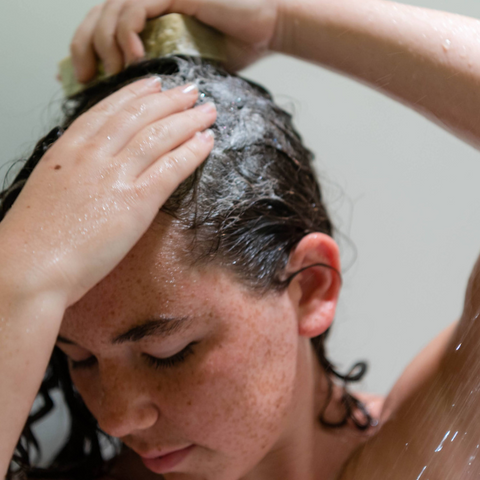 "I really like the fragrance of the Tea Tree Shampoo. It suds up nicely. My hair is very short, and I rub the bar directly on my scalp. It gives me plenty of suds, and rinses out nicely. It makes my hair feel soft and clean." - John T. |
Foaming Agents
SLS and SLES are both foaming agents. This means that they make it easier for foam to form when a product is used. Extra foaming in products like body wash and shampoo can falsely lead people to believe they are getting a better clean.
Food
Yes, you read that correctly. According to this WebMD article, "You may see SLS used in certain foods you eat, within limits approved by the FDA. As a food additive, SLS can make marshmallows fluffier and dried egg products lighter. It helps mix citrus and other acidic liquids with water to make fruit drinks."
Ummm... yuck!
Where are SLS and SLES commonly found?
If you're shopping at Goat Milk Stuff, you will never find SLS or SLES in any of our products. But if you're still buying any commercially available soap or beauty products then you are probably purchasing items with SLS or SLES in them.
The list of products is long, and it’s not restricted to cheap products only. These chemicals can be found in products across the whole spectrum, including:
- Shampoos and conditioners
- Hair dyes
- Styling gels
- Bath bombs
- Bath oils or salts
- Body wash
- Face wash
- Exfoliants
- Shaving creams
- Lip balms
- Hand sanitizers
- Nail treatments
- Foundation
- Makeup removers
- Creams and lotions
If that sounds like most of your medicine cabinet or bathroom, you’re not mistaken. Most commercial products have one or both of these chemicals in it.
 "My brother had always used typical shaving cream that's mostly chemicals. Within a week of him using it (Cedarwood Vanilla Shaving Goat Milk Soap), the rash that would always break out lower on his neck after shaving was gone. He can't get over how gentle it is and non-irritating and that there's no rash anymore that he always thought was just a byproduct of shaving. But now he knows it was a byproduct of those chemical shave creams." - Salena |
Why You Should Avoid SLS and SLES in Your Skincare
SLS and SLES are very effective compounds that do their jobs very well. However, that does not mean they are good for you. In fact, because they are so astringent and dry things out so well, they can undo much of the good other ingredients in your products offer your skin and hair.
SLS has a drying effect on the skin, which is why it often causes irritation. Many people don’t know that drying out your skin can actually make some skin conditions like whiteheads and blackheads worse. This is because it can trigger an overproduction of sebum, which is the skin’s natural oil. This overproduction can clog up pores even more.
What are Possible Health Effects of Using Products with SLS and SLES?
Many of the effects of products with SLS and SLES are subtle, and some of us are so used to them that we don’t really have any noticeable effect. That doesn’t mean our skin wouldn’t look better or be healthier if we used different products. But many people are so conditioned to using these products, that they don't realize how dry their skin actually is!
 "I bought this Oatmeal Milk & Honey liquid soap hoping it would help my dry hands during the winter. I think the liquid soap I had been using in the kitchen was drying my hands out. I love it and I do think it is helping my hands. The fact that it smells wonderful is a big plus!" - Judy J. |
There are several possible reactions you might experience when using products containing SLS.
First, the drying properties of SLS might lead to skin irritation, particularly in people with sensitive skin.
SLS has also been found to have another alarming effect - it may actually make your skin thinner. Your skin will naturally thin as you age. But using skincare products will SLS may exacerbate the aging process. This means you could have thinner, weaker skin sooner than you normally would.
Some of the other possible observed effects of SLS and SLES on the skin may include:
- Removal of your skin's natural oils
- Dermatitis
- Eczema due to drying out
- Hair loss
- Acne
As for SLES, the list is a little shorter, but no less worrisome. Using SLES can result in redness and dryness. But even more scary is that SLES has also been flagged as a possible carcinogen.
The goal of skincare and hair care should never be to just clean at any cost. Please consider the potentially harmful effects these products and ingredients can have on your body as a whole.
Why You Should Choose Natural Soap
There are two types of soap people in the world.
The first will use any bar they see in the shower, lathering with it until it becomes a tiny sliver and someone replaces it with a fresh one. Then, there are those who are a little pickier. They prefer specialty soaps and great-smelling concoctions with fancy names and intricate packaging.
No matter which category you fall into, it’s important to know what ingredients are in the products that you’re using. As we've already mentioned, just because a soap product wound up on the drugstore shelf does not mean it’s entirely safe for you or your loved ones.
 "After my sister started using the Purity soap on my niece, her eczema cleared up and has stayed away. I also really appreciate how committed PJ and her family are to keeping their products free from harmful ingredients. I feel better knowing that I'm putting safe products on my skin." - Caroline |
It can be easy to sweep concerns about ingredient safety in your soaps and skincare under the rug. After all, it’s only soap and you’re just putting it onto the surface of your skin, right?
This is a common misconception, and it’s time to debunk it. Any time you put a product on your skin, you’re initiating a process called dermal absorption.
When this happens, the chemicals travel through the outer surface of your skin, not only penetrating its inner dermal layers but also entering directly into your body. From there, they can travel to your bloodstream and throughout the rest of your system. Studies show that this chemical absorption through the skin can be unnoticeable. Most of the time, you won’t actually feel the effects right away, but they’re working right under the surface.
In fact, in some cases, dermal absorption may represent the most significant exposure pathway to systemic toxicity. If dangerous chemicals are allowed to penetrate through your skin and enter your bloodstream, they could cause health problems beyond the site of entry. You can read more about the CDC’s explanation of dermal absorption here.
Risks of Dermal Absorption
A simple bar of soap can be misleading. Lurking within the wrapper, there could be a range of noxious ingredients that could cause a variety of health concerns. Some of the most common risks include:
- Hormone disruption
- Organ distress
- Developmental changes
- Damage to the brain or brain or peripheral nervous system (neurotoxicity)
- Allergies and asthma
You may notice that a particular bar of soap irritates your skin. This is especially the case with many inexpensive drugstore varieties, which can leave you feeling itchy, red, and excessively dry. If those soaps can inflict that much damage on the outside of your body, think about the effects going on within it.
When you purchase our natural goat milk soap, you never have to worry. Not only are all of our soaps chemical free, but they’re also soothing and effective. Instead of cracking or peeling, your skin will feel hydrated, soft, and healthy. Plus, you can rest assured that your body is only absorbing nutrient-rich, natural ingredients that are actually good for it.
 "Loving Dish Washing bar soap!! The last couple of years I've been trying different DIY dish soaps for a safer chemical free option. Disappointed with everything I tried. They didn't cut through grease or they left a cloudy film on countertops, stainless steel faucets, etc. GMS Dish Washing bar soap works great!" - Natalie E. |
Give Your Skin the Best
Many people take their skin for granted. But you shouldn't! Your skin is your largest organ and protects you from infections. It also keeps moisture both in and out of your body.
According to this Healthline article, it can take anywhere from 24 - 80 days (the older you are the longer it takes) for the outer layer of your skin to regenerate and replace itself. So, in theory, if you stopped using harmful products today, you could have a whole new, healthier skin within the next one to three months!
Goat milk soap naturally helps keep skin moisturized. It does not contain SLS and SLES, so it doesn’t have the negative impact on your skin. And it has been shown to offer benefits and may even help repair your skin.
 "Absolutely love it! The Ocean scent is amazing and leaves my skin soft and moisturized. I have used different goat milk soaps but this one is the only one that did not irritate my skin." - Danielle G. |
Our goat milk soap has been shown to help fight eczema and improve the texture and quality of your skin. It’s mild and less likely to cause or worsen irritation. We don’t stop at skin either. We’ve got a full range of body care products that are free from known harmful chemicals.
These include liquid goat milk soap (instead of body wash), goat milk soap bars, specialty soaps like shampoo bars and shaving soaps, solid lotions (free of preservatives found in liquid lotions), lip balms, deodorants, and more.
 "I absolutely love this Rosemary Mint deodorant! I’m very particular about using products that are non-toxic and safe for my body, so I have tried several safer deodorants and all have stopped working at some point or I needed reapplication. This has worked tremendously well so far and I’ve not once needed to reapply during the day! I love it!" - Mandy R. |
We Use Safe Methods
We prioritize safety in everything we do at Goat Milk Stuff. Not only do we want to produce healthy, safe-for-your-skin products, but we also want to maintain these safety standards while we're making them.
- We wear gloves when handling soap ingredients or newly made soap.
- We wash our hands after using the restroom or working with the animals.
- We use raw milk that comes directly from the goats on our farm.
- We purchase ingredients from reputable businesses.
Our family and employees regularly use the goat milk soaps and skincare products. We maintain these high safety standards so we can produce safe, healthy, and natural products that will benefit your skin and ours.
Our Promise to You: A Higher Standard of Product Safety
At Goat Milk Stuff we refuse to use harsh or toxic ingredients in our natural soaps or skincare products. We guarantee our soap and shampoo ingredients are carefully sourced and meet the highest safety standards.
We make sure to exclude any of the following ingredients:
- Carcinogens: Ingredients known or linked to causing cancer.
- Mutagens: Ingredients that change the DNA of a cell, thereby harming the cell, and leading to diseases like cancer.
- Reproductive toxins: Ingredients that harm reproductive organs and increase the risk of birth defects.
- Organ toxins: Ingredients that harm internal organs and can lead to disease.
Goat Milk Stuff pledges to never use these ingredients in any of our products. There are other natural ingredients that can clean, moisturize, and scent your skin and hair without these potentially damaging effects.
We’re very committed to keeping all of these chemicals out of our products. We make sure to use fragrance oils that are free of both parabens and phthalates. We make a foaming liquid soap instead of a chemically-thickened version.
We choose to use dehydrated goat milk in our lotions and lip balms so we don't need chemical preservatives. And we promise you’ll never find any carcinogens, mutagens, reproductive toxins, or organ toxins in any of our formulas.
 "I have been using this Vanilla lip balm for years and years. It lasts a really long time, works wonderfully to prevent chapped lips, and I feel fantastic about supporting a family business. The best part is, I can use this product without fear of any harsh or dangerous ingredients, because I know that everything in it is natural and safe for myself and my family." - Meredith B. |
We’re transparent about our dedication to ingredient safety and we take your health seriously. Our products are safe to be absorbed by your skin, featuring non-irritating, food-grade ingredients that don’t harm the environment and never require any form of animal testing.
We want you and your family to feel secure in the knowledge that what you use on your skin, your hair, your lips, and your clothes is not only effective, but also safe and gentle.
